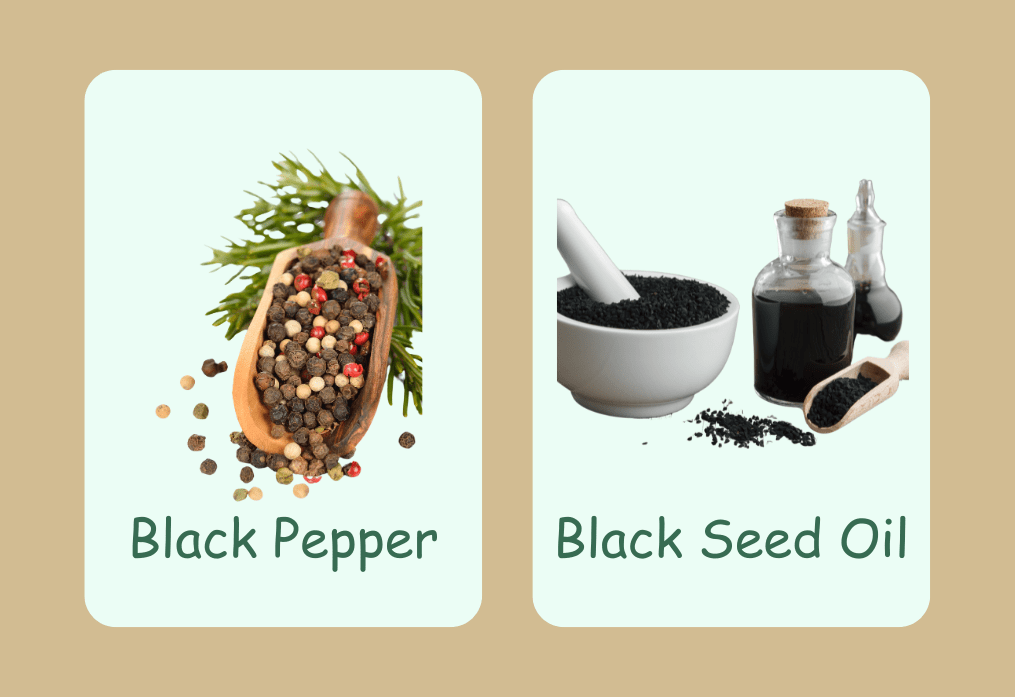Black pepper and black seed oil have been hailed for their health benefits and culinary uses. While they share some similarities, they offer unique properties and historical backgrounds that make them standout superfoods. This blog post explores the health benefits of black pepper and black seed oil, compares their properties, and provides tips for the highest benefit.
Health Benefits of Black Pepper
Rich in Antioxidants
Black pepper is a powerful antioxidant, helping to combat free radicals that can damage cells and lead to chronic diseases. The primary compound, piperine, is responsible for these antioxidant properties.
Anti-Inflammatory Properties
Piperine also has significant anti-inflammatory effects. It can reduce inflammation in the body, which is beneficial for conditions such as arthritis and other inflammatory diseases.
Enhances Nutrient Absorption
One of the black pepper’s most unique benefits is its ability to enhance the absorption of nutrients. Piperine increases the bioavailability of various nutrients and supplements, making them more effective.
Digestive Health
Black pepper stimulates the production of digestive enzymes, which aids in the breakdown of food and promotes better digestion. It also has carminative properties, which help reduce gas buildup in the intestines.
Historical Use
Black pepper has been used in traditional medicine and cooking for thousands of years. It was so valuable in ancient times that it was often used as a currency.
Best Time to Use Black Pepper
To maximize the health benefits of black pepper, it should be added to food at the end of cooking. This preserves its piperine content, ensuring you get the most out of its nutrient-enhancing properties.
Health Benefits of Black Seed Oil
Potent Antioxidant
Black seed oil is rich in thymoquinone, a compound with powerful antioxidant properties that help protect cells from oxidative stress and damage.
Anti-Inflammatory Effects
Black seed oil is renowned for its anti-inflammatory properties. It can reduce inflammation throughout the body, which is beneficial for conditions like asthma, arthritis, and other inflammatory diseases.
Immune System Support
Thymoquinone also supports the immune system by boosting the body’s defense mechanisms. Regular consumption of black seed oil can help strengthen immunity.
Skin and Hair Health
Black seed oil is beneficial for skin and hair health. It can moisturize dry skin, treat acne, and promote hair growth by nourishing the scalp and hair follicles.
Historical Use
Black seed oil has a rich history dating back over 3,000 years. It was found in the tomb of Egyptian pharaoh Tutankhamun and is mentioned in ancient texts as a remedy for various ailments. It is often referred to as a cure for everything except death.
How Black Seed Oil is Processed and Produced
Black seed oil is extracted from the seeds of the Nigella sativa plant. The seeds are cold-pressed to obtain the oil, preserving the valuable nutrients and compounds. This process involves crushing the seeds and pressing them to release the oil, which is then filtered and bottled.
Best Time to Use Black Seed Oil
Black seed oil should be taken on an empty stomach for the highest benefit. It can be consumed directly by taking a teaspoon or mixing it into smoothies, yogurt, or honey. It can also be applied topically to the skin and hair.
Which Has Better Health Benefit Properties?
While both black pepper and black seed oil offer significant health benefits, black seed oil is often considered more potent due to its wide range of therapeutic properties. Its historical reputation as a cure-all and powerful anti-inflammatory, antioxidant, and immune-boosting effects make it a standout superfood.
Conclusion
Both black pepper and black seed oil have been used for centuries for their health benefits and culinary uses. Black pepper enhances nutrient absorption and aids digestion, while black seed oil boasts a broader range of therapeutic properties, including immune support and skin health. Incorporating both into your diet can provide a comprehensive approach to improving overall health and wellness. Add black pepper at the end of cooking to maximize its benefits, and consume black seed oil on an empty stomach.
Have you tried black seed oil? Share your experiences in the comments below!
Frequently Asked Questions (FAQ) About Black Pepper and Black Seed Oil
Black Pepper
**Q: What are the main health benefits of black pepper?
** A: Black pepper is rich in antioxidants, enhances nutrient absorption, has anti-inflammatory properties, and supports digestive health by stimulating digestive enzymes.
**Q: How should I use black pepper for maximum health benefits?
** A: For the highest health benefits, add black pepper to your food at the end of cooking to preserve its piperine content, which enhances nutrient absorption and retains its medicinal properties.
**Q: Can black pepper cause any side effects?
** A: While generally safe, excessive consumption of black pepper may cause gastrointestinal irritation or allergic reactions in some individuals. It’s best to use it in moderation.
**Q: Is black pepper beneficial for weight loss?
** A: Yes, black pepper can aid in weight loss by boosting metabolism and increasing the bioavailability of other nutrients that support weight management.
Black Seed Oil
**Q: What are the primary health benefits of black seed oil?
** A: Black seed oil offers potent antioxidant and anti-inflammatory effects, supports the immune system, promotes skin and hair health, and may help manage conditions like asthma and arthritis.
**Q: How should I take black seed oil for optimal benefits?
** A: For the highest benefit, consume black seed oil on an empty stomach. You can take a teaspoon directly, mix it into smoothies or yogurt, or combine it with honey. It can also be applied topically for skin and hair health.
**Q: Are there any side effects of black seed oil?
** A: Black seed oil is generally safe but can cause allergic reactions in some people. High doses may also lead to digestive issues or interact with certain medications. It’s advisable to consult a healthcare professional before use.
**Q: How is black seed oil processed?
** A: Black seed oil is extracted from the seeds of the Nigella sativa plant through cold-pressing. This method involves crushing the seeds and pressing them to release the oil, filtered and bottled to preserve its nutrients.
General Questions
**Q: Can I use black pepper and black seed oil together?
** A: You can use both to harness their combined health benefits. Black pepper can enhance the absorption of nutrients, potentially making black seed oil more effective.
**Q: Which is better for inflammation, black pepper or black seed oil?
** A: Both black pepper and black seed oil have anti-inflammatory properties, but black seed oil is often considered more potent due to its high thymoquinone content.
**Q: How far back do the uses of black pepper and black seed oil go?
** A: Black pepper has been used for centuries and is valued in ancient trade and medicine. Black seed oil’s history dates back over 3,000 years, with its presence found in the tomb of Egyptian pharaoh Tutankhamun and mentioned in ancient texts.
**Q: Can these be used for seasoning food?
** A: Yes, black pepper is a common spice used for seasoning. Black seed oil can also be used as a seasoning or added to dressings and dips to enhance flavor and health benefits.
Medical Disclaimer for Mama Vega Enterprises: Optimal Health 360 Blog Post
The information on the Mama Vega Enterprises: Optimal Health 360 blog is for general informational purposes and is not a substitute for professional medical advice, diagnosis, or treatment. Always seek the advice of your physician or other qualified health provider with any questions you have concerning a medical condition.
Never disregard professional medical advice or delay seeking it because of something you have read on this blog. The opinions expressed by the authors are their own and do not necessarily show the views of Mama Vega Enterprises, its subsidiaries, or its affiliates. Mama Vega Enterprises does not endorse or assume any responsibility for the accuracy or reliability of any opinions, advice, or statements on the blog.
Call your doctor, go to the emergency department, or call 911 immediately if you have a medical emergency. Reliance on any information Mama Vega Enterprises provides: Optimal Health 360, its contributors, or other visitors to the blog is solely at your own risk.
Mama Vega Enterprises is not responsible for the content of linked third-party sites and does not make any representations regarding the accuracy, completeness, or other aspect of the information on such sites. The inclusion of any link does not imply endorsement by Mama Vega Enterprises.








